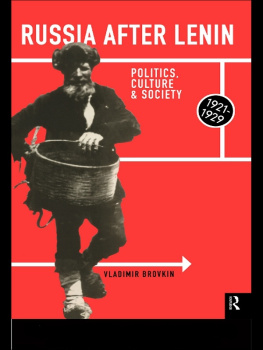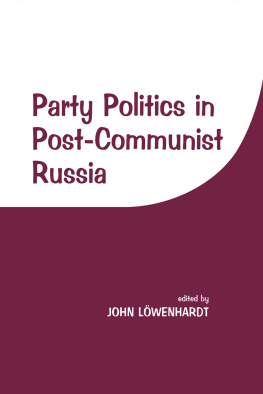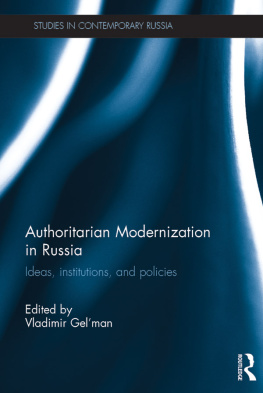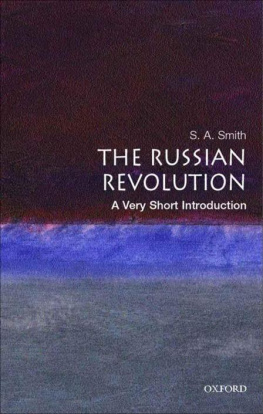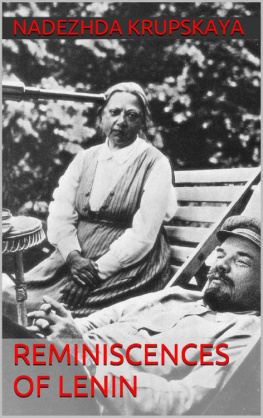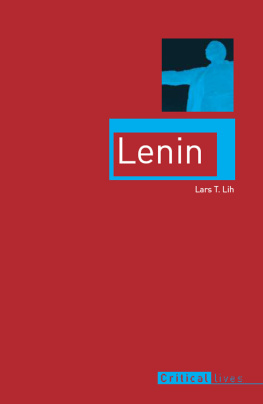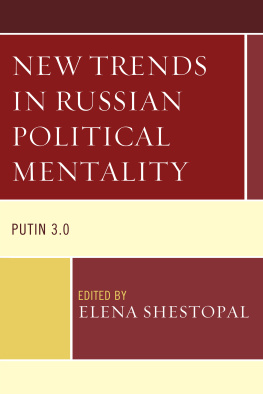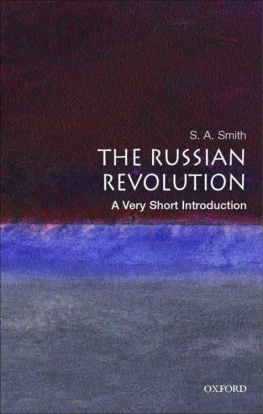by Routledge
11 New Fetter Lane, London EC4P 4EE
This edition published in the Taylor & Francis e-Library, 2005.
To purchase your own copy of this or any of Taylor & Francis or Routledges collection of thousands of eBooks please go to www.eBookstore.tandf.co.uk.
Simultaneously published in the USA and Canada
by Routledge
29 West 35th Street, New York, NY 10001
1998 Vladimir Brovkin
All rights reserved. No part of this book may be reprinted or reproduced or utilized in any form or by any electronic, mechanical, or other means, now known or hereafter invented, including photocopying and recording, or in any information storage or retrieval system, without permission in writing from the publishers.
British Library Cataloguing in Publication Data
A catalogue record for this book is available from the British Library
Library of Congress Cataloging in Publication Data
Brovkin, Vladimir N.
Russia after Lenin: Politics, Culture and Society,
19211929 / Vladimir Brovkin.
p. cm.
Includes bibliographical references and index.
1. Soviet UnionPolitics and government19171936.
2. Soviet UnionCivilization. 3. Soviet UnionSocial
conditions-19171945. I. Title.
DK266.5.B76 1998
947.0842dc21
9739751
CIP
ISBN 0-203-97933-8 Master e-book ISBN
ISBN 0-415-17991-2 (hbk)
ISBN 0-415-17992-0 (pbk)
FOR MY DEAR WIFE, ALYONA
Illustrations
Abbreviations
| Agitprop | Agitation and Propaganda Department of the Central Committee |
| CC | Central Committee |
| CEC | Central Executive Committee |
| CheKa | Chesvychainaya KommissiyaExtraordinary Commission |
| Chon | Chasti Osobogo NaznacheniyaSpecial Purpose Units |
| Comintern | Communist International |
| CP | Communist Party |
| EC | Executive Committee |
| GK | Gorodskoi KomitetCity Committee |
| GPU | Glavnoe Politicheskoe UpravleniaMain Political Directorate |
| Gubkom | Gubernskii KomitetProvince Committee |
| Glavlit | Glavnyi Literaturnyi KomitetMain Literature Committee |
| Gublit | Glavnyi Literaturnyi KomitetMain Literature Committee |
| KA | Komsomol archive |
| Komsomol | KSM Kommumsticheskii Soyuz MolodezhiCommunist Youth League |
| LK | Leningradskii KomitetLeningrad Party Committee |
| MK | Moskovsku KomitetMoscow Part Committee |
| MRC | Main Repertoire CommitteeGlavrepertkom |
| NS | Narodnye SotsialistjyPeoples Socialists |
| Orgraspred | CC Cadres Department |
| PSR | Part of Socialist Revolutionaries |
| PSR | Part of Socialist Revolutionaries |
| Pioletkult | Proletarskaya KulturaProletarian Culture |
| RCP(b) | Russian Communist Party of BolsheviksRKP(b) |
| SR | Socialist Revolutionary |
| VKP(b) | Vsesoyuznaya Kommunisticheskaya Partiya Bolsheukov AllUnion Commumst Party of the Bolsheviks |
| VLKSM | All Russian Leninist Komsomol |
| VTsSNKh | Vrerossiiskii Tsentralnyi Sovet Narodnogo KhoziaistvaAllRussian Central Council of Peoples Economy |
Acknowledgments
I always wanted to write a book on politics and culture in the 1920s that would be a sequel to Rene Fllop Millers path-breaking The Mind and Face ofBolshevism (1926). In 1991 I was much influenced by my then colleague Simon Schamas discussion of culture and politics during the French Revolution in his Citizens. I was fascinated by the works of Robert Darnton and Roger Chartier on mentalities and representations. I owe an intellectual debt to many colleagues who had worked on the history of culture and politics in Russia, particularly Leonard Schapiro, Adam Ulam, Robert Tucker, Stephen Cohen, Richard Stites, Katerina Clark, Martin Malia, Robert Conquest, Peter Kenez, and Wladimir Berelovitch, to name only a few. I learned a great deal from Sheila Fitzpatrick, William Rosenberg, and Diane Koenker on the social history of the 1920s. I gained insight on youth culture and history of women from the works of Anne Gorsuch, Isabel Tirado, and Wendy Goldman.
Among my colleagues I owe deep gratitude to Richard Pipes who was the first reader of this book and gave me valuable suggestions. I also want to thank Caroline Ford who literally guided me through the literature on culture, mentalities, and representations. Above all I want to thank David Brandenberger who helped me translate some verses, edited the manuscript, and gave me valuable insights during our regular discussion sessions as the work progressed.
Research for this book has been made possible by the IREX Fellowship. I am grateful to IREXs Moscow staff who made my stay there fruitful and enjoyable. A generous grant from the John M.Olin Foundation enabled me to complete the manuscript and prepare it for publication.
Introduction
Revolutionary identity
The 1920s are popularly known as a Golden Age in Russiaeight short years after the end of the civil war and before Stalins revolution from above. Much admired in both Soviet, post-Soviet Russian and Western historiography, the period of New Economic Policy has been seen as an alternative to Stalinism. The 1920s have been hailed as an example of at least one period in Soviet history which was a success, in economics, politics, and especially in terms of culture.
Soviet historians tended to represent the years of the NEP as a march forward towards socialism due to the wisdom of Lenin. From this perspective, the 1930s were the years of even more spectacular achievements but marred by what were called violations of socialist legality, a code name for the Great Terror. Most studies of political history of the 1920s have regarded the NEP years as an asset of the Bolsheviks and as proof that had it not been for Stalin a different kind of socialism could have emerged in Soviet Russia, socialism with a human face, displaying cultural diversity and private enterprise.

